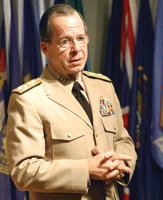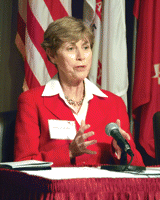Project Shows Communities Best Ways to Help Vets Deal With MH Issues
Abstract
American troops and their families need many layers of support at the local level to help cope with the stresses of war and injury, and a new pilot program seeks to coordinate those efforts around the country.
The Community Blueprint is a collaborative project to guide communities throughout the United States in providing services to those who have returned from service in Iraq and Afghanistan, said Barbara van Dahlen, Ph.D., founder and president of Give an Hour, announcing the Community Blueprint program at the Women in Military Service Memorial at Arlington National Cemetery on June 14.
Give an Hour is an organization that connects volunteer psychiatrists and other mental health professionals with current and former military personnel and their families for an hour of free therapy each week. APA has supported Give an Hour since its inception (Psychiatric News, March 7, 2008).
Community Blueprint has collected examples of existing programs, vetted them for suitability, and plans to publicize them so that other communities can adopt or adapt them.
So far, two pilot programs are in operation, in Fayetteville, N.C., and Norfolk, Va.

Adm. Mike Mullen, chair of the Joint Chiefs of Staff, says that the United States must offer support for combat veterans and their families for at least another decade and that community-level programs are essential.
Community-level programs are essential, Adm. Mike Mullen, chair of the Joint Chiefs of Staff, told attendees.
"The troops and their families who have sacrificed so much are young and have so much to offer our country with a little investment now in their future," said Mullen.
"Many of these families are invisible to the nation and to the communities in which they live," he said. "Focusing on families before, during, and after deployment is not only the right thing to do, but is also fundamental to our military readiness. Taking care of our own sends that message."
Providing support for combat veterans, families, and children meant learning which organizations were making a difference, understanding their best practices, and then sharing them where needed.
That will be no overnight process, said Mullen. "It will take another 10 years to wind up this war and deal with its aftermath."

Deborah Mullen, the wife of Adm. Mike Mullen, urges civilian mental health professionals to learn more about military life and culture if they are to successfully help returning veterans and their families.
Expanding access to civilian care providers was not simple, said the admiral's wife, Deborah Mullen, who has taken a special interest in helping military families deal with the stresses of having a loved one in combat.
"People go to therapy, pour out their guts, and explain their lives," she said. "They end up educating the therapist about military culture and life in combat—but don't get the help they need."
That had to change, she said. "We need mental health providers who understand military life and military people."
The Community Blueprint offers several programs to accomplish that.
For instance, San Francisco-based Combat to Community provides training to help mental health care clinicians and others work with returning veterans who have posttraumatic stress disorder (PTSD) and other psychiatric disorders.
The organization also provides training to "improve the ability of police officers to work with young veterans with PTSD and other mental health disorders," in order to "minimize critical incidents and poor outcomes, and increase officers' ability to direct veterans toward appropriate treatment rather than incarceration," according to the organization's Web site.
North Carolina's Citizen Soldier Support Program helps educate primary care and mental health care providers to better understand military culture and so develop a larger base of care for troops and their families, especially National Guard and reservists, who are often geographically dispersed and not near Department of Veterans Affairs facilities.
Similar programs exist in other states as well.
In Norfolk, the Blue Star Families created a program in which organizations like the Girl Scouts and church groups write letters to military families, said Vivian Greentree, Blue Star's director of research and policy. They also have set up an alliance with Old Dominion University to smooth the way for returning service members, she said.
Nationally, the Defense Centers of Excellence at the Department of Defense has established its Real Warriors Campaign to fight the stigma that often keeps service members from seeking mental health care. The program has a 24-hour call center and other sources of information to help troops or veterans.
At the meeting, a representative of the Bristol-Myers Squibb Foundation announced the award of a $2 million grant to Give an Hour to support the Community Blueprint demonstration sites in Norfolk, Va., and Fayetteville, N.C., both adjacent to major military bases.
The Walmart Foundation also announced a $144,000 small-grant program to organizations in the same two cities.



